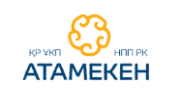
SUBJECTS OF SMALL AND MEDIUM-SIZED BUSINESSES OF ALMATY, SHYMKENT AND KARAGANDA REGIONs HAVE THE LARGEST CONCENTRATION OF DEBTS ON TAXES
The official deadline for the completion of a tax amnesty for small and medium-sized businesses expires on December 31, 2019. According to the State Revenue Committee, potential participants are 90,077 taxpayers who as of October 1, 2018 had arrears of 210.4 billion tenge, penalties - 122.9 billion tenge, fines - 7.4 billion tenge.
Will everyone be able to take advantage of tax amnesty and how actively are small and medium-sized businesses involved in this action? These and other questions are answered by Zhandos Duisembiyev, Director of the Audit Department of the SRC MF RK.
- Zhandos Zhumabaevich, how do you assess the results of the write-off of debts in the first half of this year?
- As international experience and experience of previous domestic programs prove, of course, amnesty is an effective alternative to get rid of the burden of tax obligations. And taxpayers use it. Nevertheless, the main goal is not to replenish the budget, but to return the business to the legal field, preserve jobs in existing enterprises and improve the economy in the areas of small and medium-sized businesses.
Since the advantage of this amnesty is a 100% reduction in fines and a growing daily penalty, the business community welcomed this initiative, given the significant size of this business segment. And state revenue agencies are ready to help resolve the situation during the term of the amnesty, that is, until December 31, 2019.
As of July 1, 2019, 39,330 taxpayers joined the “Tax Amnesty for Small and Medium-sized Business” program by repaying the main debt on taxes of 7.6 billion tenge. A penalty of 2.1 billion tenge and fines of 180.6 million tenge were written off.
- In the media, social networks are discussed relatively weak dynamics of the ongoing tax amnesty. After all, just over 7 billion tenge of the 210 billion tenge announced earlier by the Committee was repaid. How do you explain these facts?
- Indeed, the amount of repayment by taxpayers amounted to only 3.6% of the total amount of arrears, formed on October 1, 2018. However, here it is necessary to reason carefully and correctly communicate to the public the following: every taxpayer has the same right to become a member of this program.
The launch time of the amnesty corresponds to a global reinforcement to combat tax evasion. About half of all debt (44.4% or 93.4 billion tenge) is accounted for by VAT. And this type of tax is subject to a high risk of using the so-called “gray” and “carousel” schemes for offsetting VAT. Debts are most common in the construction industry, wholesale and retail trade, and in the provision of services, which account for more than 60% of the debt and directly or indirectly relate to public procurement (contractors, subcontractors, suppliers at all levels, etc.).
If you look geographically, a significant concentration of debt corresponds to the concentration of tax revenues: Almaty (13.5%), Shymkent (13.4%) and Karaganda region (13.8%).
If we talked above about the benefits and unique opportunities from the participation of taxpayers in the amnesty, subject to repayment of the principal, then let's discuss the potential problems and steps taken by the Committee to ensure that the amnesty is successful.
Firstly, the problem is the high level of indebtedness for persons who have become liquidated, bankrupt, inactive and others as of the current date. Their number is 18,489 persons with total arrears of 136.1 billion tenge, or 65% of the amount announced as of 01.10.2018.
Secondly, the declaration of amnesty itself does not affect the behavior of the taxpayer. The decision of the taxpayer to join the program depends on the resources and targeted efforts.
For example, the list of persons potentially subject to Amnesty includes a taxpayer, the amount of arrears of which is about 700 million tenge. Arrears formed in April 2017. In respect of the taxpayer, methods and measures of enforcement have been applied, which have not led to repayment. Since April 2017, the company does not conduct financial and economic activities, does not submit tax reports, is absent at the legal address and according to the authorized bodies has no assets to repay the debt.
Consequently, this taxpayer claims for amnesty of debts to the budget, but his participation in the program is still questionable.
This is a well-known global practice, when the taxpayer independently weighs the benefits and costs of tax evasion. Some entrepreneurs remain in the "shadow".
Therefore, despite the discussed effectiveness of the Amnesty, the Committee still has 3 responsibilities: explanatory work among taxpayers, tax control and ensuring the fulfillment of tax obligations by taxpayers in full. The notification work was organized, all targeted notifications were sent to participate in the program, and seminars in the regions held in the 1st half of the year and planned in the 2nd half of the year.
- In principle, the statistics and arguments given by you put all the points over I. Could you tell in detail when the Amnesty really helped the taxpayers?
- Unlike those who still passively remain in the "shadow", there are positive examples of restarting the business, which, it would seem, cannot be saved. As I mentioned earlier, about forty thousand taxpayers used the opportunity to write off debts. If we exclude inactive, bankrupt, it is more than 50% of debtors.
They were written off penalties, fines and, accordingly, removed all restrictions and arrests from Bank accounts, property and other, that is, there was a full opportunity to continue to conduct their business.
I will give one of the examples of Aktobe region. LLP provides technical services in the field of mining and as of October 1 had outstanding tax debt on corporate income tax of 470 million tenge, including arrears – 138.3 million tenge, the penalty exceeded the principal debt by almost 3 times. As a result of participation in the tax Amnesty through the paid tax of 138.3 million tenge, the taxpayer was written off penalties in the amount of 331.6 million tenge.
As you know, the write-off of such amount had a positive impact on the corporate portfolio of the company.
According to experts, the participants of the program "Tax Amnesty for small and medium-sized businesses" have great advantages. Although the method has already been worked out: the repayment of the principal amount of the debt will lead to the write-off of penalties and fines without the taxpayer's application. If necessary, if you find outstanding debt, you can contact your local government revenue authority, where you will receive the necessary calculations and advice for debt cancellation.
At the same time, for taxpayers not included in the list of tax Amnesty, there are other methods of settlements with the budget, such as installments and deferred payments.
- Thank you for the interview, for a detailed analysis of the current situation on the tax Amnesty.
- In conclusion, I would like this year to be marked by cooperation and mutual respect. Our state body is open for working and operational contacts to address issues caused by tax policy. There are still 6 months ahead, and I hope that in the near future there will be a full reaction from entrepreneurs aimed at removing the accumulated debt burden on penalties and fines.





























